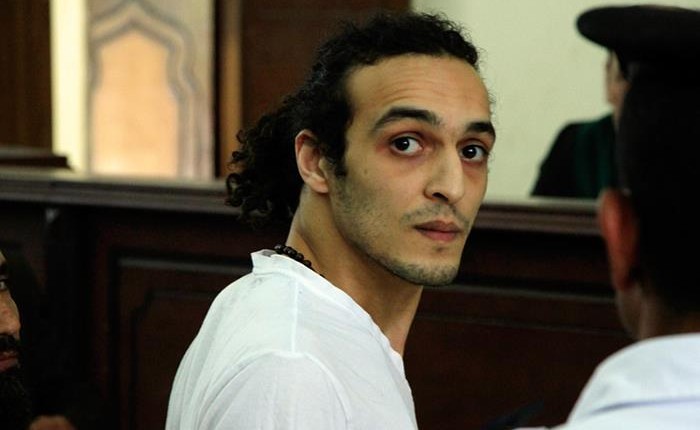 Two yeaphotojournalist Mahmoud Abu Zeid, better known as Shawkan, has exceeded the maximum legal pre-trial detention periodrs after his arrest during the forceful dispersal of pro-Muslim Brotherhood sit-ins by security forces, .
Two yeaphotojournalist Mahmoud Abu Zeid, better known as Shawkan, has exceeded the maximum legal pre-trial detention periodrs after his arrest during the forceful dispersal of pro-Muslim Brotherhood sit-ins by security forces, .
Having spent over two years in prison without standing trial, rumours that he was in fact referred to trail were rebutted by Shawkan’s defence lawyer, who confirmed the defendant was not informed of the referral, a mandatory procedure that legalises it.
“Referral to court to stand trial doesn’t affect the situation of Shawkan, whose release has been mandatory after exceeding the maximum pre-trial detention period,” said Ahmed Abdel Nabi, one of Shawkan’s defence lawyers.
Abdel Nabi told Daily News Egypt that Shawkan was not informed of the referral to trial. The charges Shawkan faces include attempted murder, possession of weapons and ammunition, threatening public peace, disrupting the constitution, and sabotaging public and private property.
News emerged on Tuesday of the defendants in a case titled the “Rabaa Militant Sit-In”, including the Muslim Brotherhood’s Supreme Guide Mohamed Badie, being referred alongside a number of the group’s leaders and members.
Shawkan was rumoured to have been referred to the criminal court in the same trial, although such reports were not confirmed.
“There is a lack of, and ambiguity in, information from the general prosecution,” Abdel Nabi explained, adding that there are two cases, namely the “Rabaa Militant Sit-in” and “Rabaa Sit-in Dispersal”. It is believed that, if Shawkan is to be referred to court, it will be on the latter case.
“What is confirmed is that there will be a detention renewal session for Shawkan on Monday,” Abdel Nabi said. “We will file a report to demand his release after completing maximum pre-trial detention.”
The photojournalist’s arrest has received wide attention and condemnation from the press community inside and outside of Egypt.
On Thursday, members of the Press Syndicate filed a complaint to the Prosecutor General’s office demanding Shawkan’s release, as he has completed the legal pre-detention period.
The Committee to Protect Journalists (CPJ) urged the Egyptian government Thursday to release Shawkan from prison and “immediately and drop the baseless allegations against him”.
Sherif Mansour, the CPJ’s Middle East and North Africa official, said: “We call on authorities to put an end to this staggering injustice and set Mahmoud Abou Zeid free immediately.”
Reporters Without Borders also joined the calls for Shawkan’s release, with the organisation’s programme director, Lucie Morillon, referring to his detention as “intolerable”.
“He has been subjected to one of the longest periods of provisional detention in Egypt’s history, having spent more than 700 days in prison without any formal charges being brought against him,” Morillon said.
She added: “This intolerable situation must end at once. He must be freed without more ado. We want no less from the hearing on 17 August.”
A hearing session for Shawkan was adjourned to 17 August for unspecified “security reasons”, after it was first scheduled to 3 August.
Repeated delays to hearing sessions for the journalist, who has nor been tried since his arrest, have been occurring despite Shawkan’s deteriorating health.
The Reporters Without Borders statement warns: “This young photojournalist’s already fragile health has worsened steadily, because of the conditions to which he has been exposed in prison for the past two years.”
Shawkan is suffering from Hepatitis C, and wrote in a letters from prison: “Despair penetrated my red blood cells and kidney, my brain rejects sleeping and my body sweats continuously. Losing consciousness for a few minutes became a habit on a daily basis. My weak body, full of disease, became helpless to continue bearing hard imprisonment for two years, without any guilt except bearing my camera to shoot events with neutrality and objectivity.”



